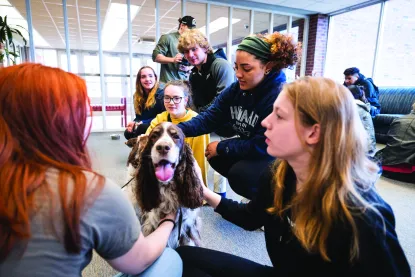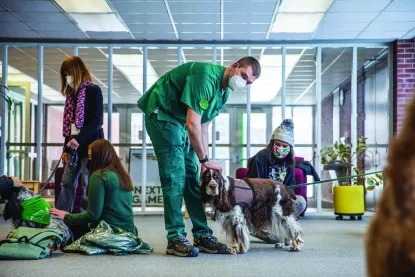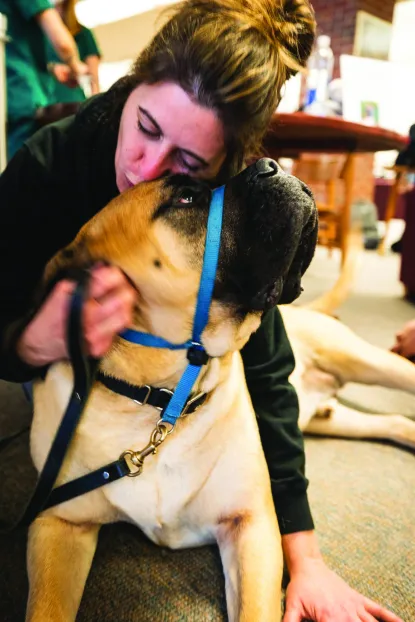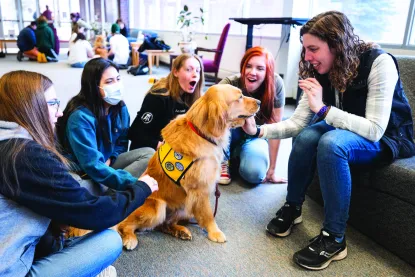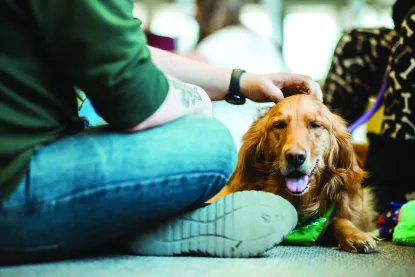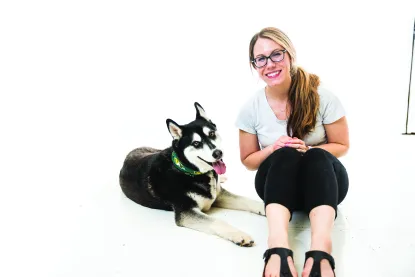
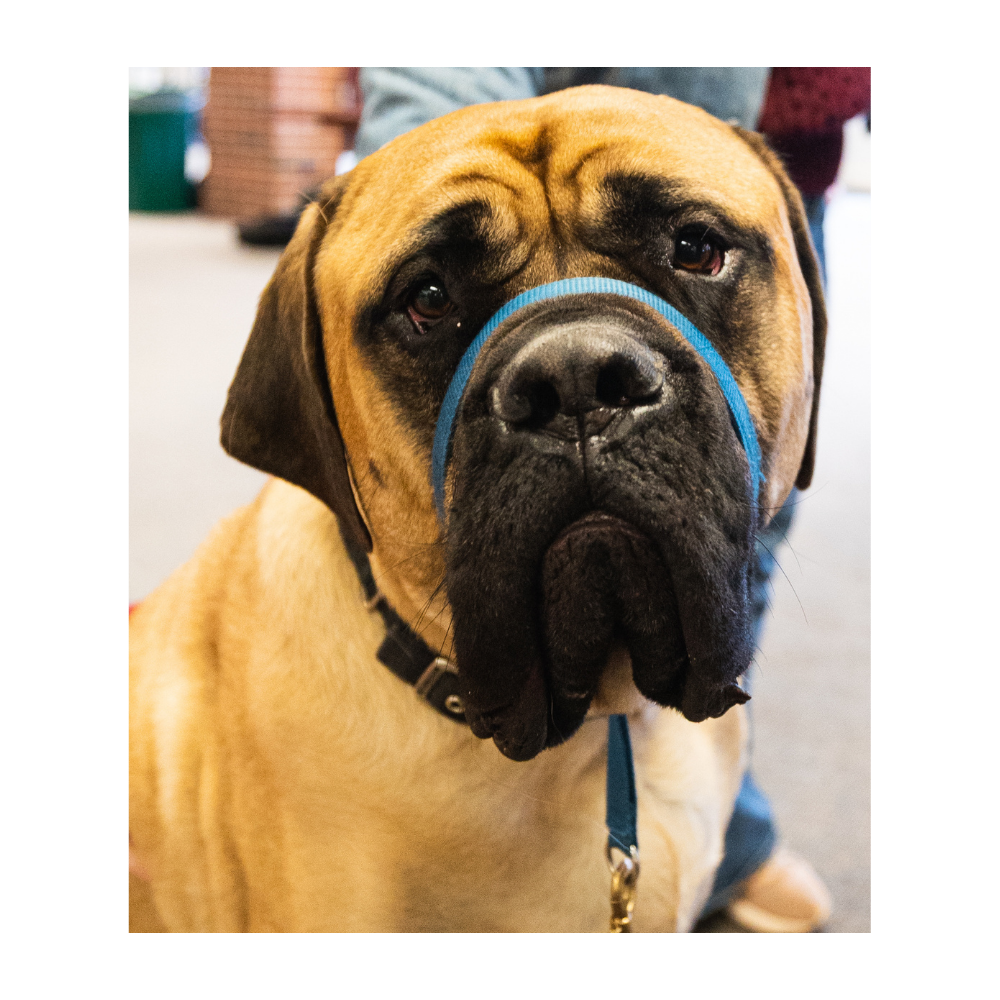
Fonzie, Boris, Molly, Ramsey and Sadie are new therapists on campus. They specialize in shaking hands, drooling and looking adorable. They are the Northern Michigan University Wildpups. Along with their humans—NMU nursing faculty—they are not only helping to relieve stress and anxiety among students, faculty and staff, they are conducting groundbreaking research and providing insights on the effects of therapy animals on a college campus. The Siberian husky, English mastiff, golden doodle, Australian shepherd and golden retriever aren’t just cute faces, they are trained and registered therapy dogs, who work wonders with Wildcats.
The Wildpups program started when new nursing faculty member Dr. Michelle Andriacchi mentioned her interest in pet therapy at an NMU New Faculty Buzz Session. To her surprise, many of her new colleagues had questions and ideas about pet therapy and how it might provide a sense of relief to those who are feeling stressed or have anxiety at NMU. Eventually, fellow dog lovers and nursing faculty Casey Hopper, Dr. Anne Stein ’91 BS, ’95 BSN, ’98 MSN, Dr. Rachel Nye ’00 BSN, ’18 DNP and Katie Taylor ’12 BSN wrote a grant proposal and received funding from the university. Dominic Andriacchi from political science and Dr. Kristen Smith ’91 BSN, ’18 DNP from nursing were also integral in forming the Wildpups.
“It was something we really wanted to do for our campus community, and Northern believed in our vision,” said Michelle Andriacchi.
“This also started because our boss, Dr. Kristi Robinia, was so concerned when we were in the thick of the pandemic. She was worried about losing nursing students, and for students who were depressed all across campus and were looking for mental health services and couldn’t find them because they were just so over-run,” said Hopper.
“We had students not just stressed out, but alone and disconnected, without having a social aspect in their lives, so this program couldn’t have come at a better time.”
Last fall, the program launched when nursing faculty and community members held events with registered therapy dogs at Northern’s Olson Library.
In addition to providing connectedness and support for campus, they started research on the animals’ effects on students, while providing safe, social and fun events. All of the dogs completed training through Dogs Beyond the Fence and testing with Superiorland Pet Partners to become registered therapy dogs in order to participate.
The Wildpups team was surprised when more than 400 people showed up to meet the dogs at the first event.
Nursing students assisted with conducting a pre-survey to look at students’ stress and anxiety and vital signs including blood pressure, heart rate and respiratory rate prior to spending time with the pups. Then the dogs and masked students sat casually on the floor in a wide area of the library, getting to know each other and engaging in sweet conversations and gentle rubs. Often students shared phone photos with each other of their own dogs back home. An exit survey then captured anecdotal evidence and personal perceptions of changes in anxiety and stress, and vital signs were again measured and recorded.
The Wildpups team did not know if their research would eventually yield any results, since there were very few articles about animal assisted therapy on a college campus. But Hopper said that even if the study was inconclusive, “It doesn't matter, look how happy these kids are at these events!”
“In the survey, we saw comments such as, ‘Thank you for doing this, I really needed this today.’ Or they said they were having the worst day ever, they were crying, and then they came to the Wildpups and feel so much better,” reported Andriacchi.
“The program has grown and the students especially love it. They have requested stickers and t-shirts with their favorite dogs on them,” she said.
“This is what we envisioned. This program has brought an element of relief to campus.”
It has also provided opportunities for students from various majors and groups to get valuable experience, and let them know of other helpful resources. For example, conducting the surveys and taking vitals helps nursing students practice and get clinical hours for their nursing courses and understand research processes. Undergraduate social work students studied the Wildpups for a class project. Other student organizations assisted and used the events as outreach for their missions.
Student Leader Fellowship program participant Baylee McLevis has volunteered 75 hours of her time to help set up each event. “Watching all of the dogs come into the library is so fun to see because they get so excited. As soon as the students come into the library, seeing the excitement on their faces is so rewarding. Being a part of this program has allowed me to not only spend time with the dogs, but learn about what it takes to prepare an event like this and what it takes to become a leader and innovative volunteer,” said McLevis.
The Wildpups team also expanded their own horizons, learning risk management, logistics, legal matters and marketing. It is much more than just bringing dogs to campus. “We are learning still and growing and we have so much more to learn and grow from. But we have come a long way in less than a year,” said Andriacchi.
Recently, the dogs have been broadening their reach, making appearances at nursing homes, dorm events, athletic practices, movie nights, yoga sessions and other special events. They have also been working with Upper Peninsula Health System to support its nurses.
Continuous support from the campus community has earned the Wildpups team two additional grants to grow the program and continue researching the effects of pet therapy on a college campus.
So far, the results are promising. “We saw a significant decrease in individuals’ perceived stress and anxiety along with improvement in their vital signs,” said Hopper. “It has been really positive, not only for the students, but for faculty and staff who participate in the events, helping to make others feel good.”
The program has expanded outside of nursing. Other faculty and departments are joining the team, and seven new canines are enrolled in training to become future Wildpups. The team hopes to make the Wildpups sustainable for years to come.
written by Jessica-Ann Woodard
